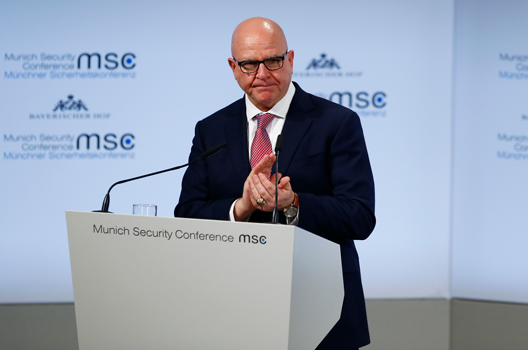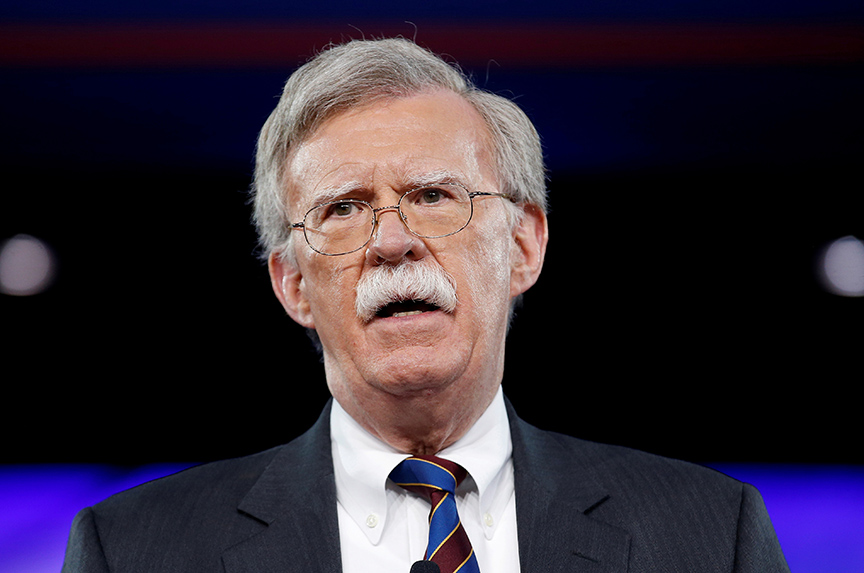 John R. Bolton, a former US ambassador to the United Nations known for his hawkish foreign policy views, will replace LTG H.R. McMaster as US President Donald J. Trump’s new National Security Advisor.
John R. Bolton, a former US ambassador to the United Nations known for his hawkish foreign policy views, will replace LTG H.R. McMaster as US President Donald J. Trump’s new National Security Advisor.
Trump made the personnel announcement in a tweet on the evening of March 22.
The decision to replace McMaster comes nine days after Trump fired former Secretary of State Rex Tillerson—also in a tweet. He nominated central Intelligence Agency (CIA) Director Mike Pompeo to replace Tillerson.
With Pompeo and Bolton, Trump will have two new members of his team who share his hawkish take on foreign policy.
Unlike Tillerson’s firing, McMaster’s exit was reportedly a mutual decision.
“H.R. McMaster has served his country with distinction for more than thirty years. He has won many battles and his bravery and toughness are legendary,” Trump said in a statement. “General McMaster’s leadership of the National Security Council staff has helped my administration accomplish great things to bolster America’s national security.”
Bolton will take over on April 9. He will bring with him his more hawkish views. He has, for example, said that the United States should declare war on North Korea and Iran.
“The inconvenient truth is that only military action like Israel’s 1981 attack on Saddam Hussein’s Osirak reactor in Iraq or its 2007 destruction of a Syrian reactor, designed and built by North Korea, can accomplish what is required. Time is terribly short, but a strike can still succeed,” Bolton wrote on dealing with Iran’s nuclear program in the New York Times in 2015 as the Obama administration was negotiating a deal with Iran.
Bolton takes office as the Trump administration is preparing for a summit between the US president and North Korean leader Kim Jong-un.
In an opinion piece headlined “The Legal Case for Striking North Korea First,” Bolton wrote in the Wall Street Journal on February 28: “Pre-emption opponents argue that action is not justified because Pyongyang does not constitute an ‘imminent threat.’ They are wrong. The threat is imminent, and the case against pre-emption rests on the misinterpretation of a standard that derives from prenuclear, pre-ballistic-missile times. Given the gaps in US intelligence about North Korea, we should not wait until the very last minute. That would risk striking after the North has deliverable nuclear weapons, a much more dangerous situation.”

John R. Bolton will take over as the next US National Security Adviser on April 9. (Reuters/Issei Kato)
Here is what Atlantic Council analysts had to say about the latest change of guard in the Trump administration.
Barry Pavel, senior vice president, Arnold Kanter chair, and director of the Scowcroft Center for Strategy and Security at the Atlantic Council:
“As with the change from Secretary of State Rex Tillerson to Michael Pompeo, President Trump made this move to bring on a more like-minded adviser. This means the constraints keeping US foreign policy toward the mainstream are now greatly loosened. Buckle up: US foreign and national security policy are about to get far more assertive.”
Matthew Kroenig, deputy director in the Scowcroft Center for Strategy and Security.
“In year one, Trump selected national security officials with his head. In year two, he allowed himself to also be guided by his heart.
“With a national security team of Trump, Bolton, Pompeo, and Mattis, America will not have a credibility problem when it comes to threats to use military force.”
Barbara Slavin, director of the Atlantic Council’s Future of Iran Initiative.
“News that President Trump has chosen John Bolton as his third national security adviser has understandably created consternation among those who support the nuclear agreement with Iran and diplomacy with North Korea.
“That said, Bolton will serve—as all administration officials do—at the pleasure of the president. The decision whether to remain within the Joint Comprehensive Plan of Action [the nuclear deal with Iran] or to enter talks with North Korea are the president’s and he alone bears responsibility for the consequences of his decisions.”
Todd Rosenblum, nonresident senior fellow in the Scowcroft Center for Strategy and Security.
“The president’s decision to add another civilian to the highest ranks of his national security coterie will help balance his over reliance on military personnel in the making of foreign policy and national security.
“Still, it is not clear that John Bolton will be any more effective than his predecessors, especially given Bolton’s hawkish views on Russia and the president’s belief that his instincts alone are enough for sound policy.”
Evelyn Farkas, nonresident senior fellow in the Atlantic Council’s Future Europe Initiative, Eurasia Center, and Scowcroft Center for Strategy and Security.
“Ambassador Bolton has a reputation for advocating for use of force and for deep skepticism about negotiated nonproliferation and arms control. He has also been reported to be disdainful of career experts. Let’s hope that in this new position many years after he last served he will offer a fair hearing for all views, will not put his finger on the scales in favor of military force, and that he will treat his career colleagues with the full respect they deserve.”
Ashish Kumar Sen is deputy director of communications, editorial, at the Atlantic Council. Follow him on Twitter @AshishSen.
Image: US National Security Advisor H.R. McMaster talks at the Munich Security Conference in Munich, Germany, February 17, 2018. (REUTERS/Ralph Orlowski)
